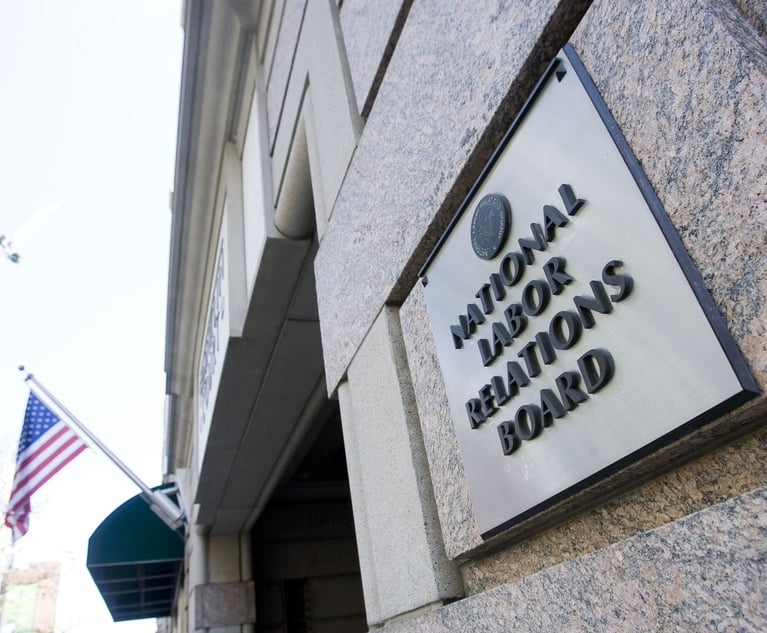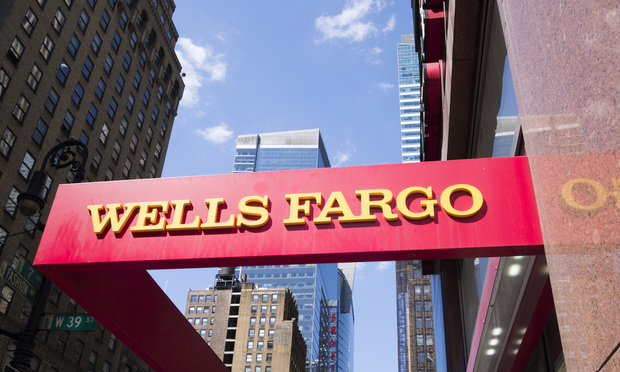Wells Fargo's Whistleblower Problem Could Grow Substantially
Two weeks after being ordered to reinstate a branch manager fired for raising concerns about improper sales practices, Wells Fargo & Co. has…
August 07, 2017 at 07:59 PM
5 minute read
Two weeks after being ordered to reinstate a branch manager fired for raising concerns about improper sales practices, Wells Fargo & Co. has acknowledged it could have a much larger whistleblower problem in the aftermath of a $185 million settlement with federal regulatorsand Los Angeles last year over allegations the bank opened up to 2.1 million unauthorized accounts.
Wells Fargo told federal regulators Friday in a quarterly report to the U.S. Securities and Exchange Commission that it is facing “multiple single plaintiff Sarbanes-Oxley Act complaints and state law whistleblower actions filed with the Department of Labor or in various state courts alleging adverse employment actions for raising sales practice misconduct issues.” The report also noted that expanded regulatory oversight of the bank's sales practices “may lead to a significant increase in the identified number of potentially unauthorized accounts.”
For Wells Fargo, the pending whistleblower complaints pose both a financial and reputational risk as the bank seeks to rebound from a scandal that prompted its chief executive, John Stumpf, to step down. Wells Fargo on Friday reported that its legal costs could exceed $3.3 billion.
“Wells Fargo may have substantial exposure in some of the whistleblower cases because many of the whistleblowers were unable to secure comparable employment in the financial services industry. Therefore, back pay liability and lost future earnings in some of these cases will likely exceed $1 million,” said Jason Zuckerman, a whistleblower lawyer at Washington's Zuckerman Law.
Last month, the U.S. Labor Department ordered Wells Fargo to pay $577,500 in back pay, damages and legal fees to a former branch manager in California fired in 2011 after raising concerns about three subordinates—described as “private bankers.” The department's Occupational Safety and Health Administration found that the branch manager's reports were a contributing factor in her firing and made her eligible for whistleblower protections under the Sarbanes-Oxley Act and the Consumer Financial Protection Act.
“No banking industry employee should fear retaliation for raising concerns about fraud and practices that violate consumer financial protections,” Barbara Goto, the OSHA's regional administrator in San Francisco, said in a statement then. “The U.S. Department of Labor will fully and fairly enforce the whistleblower protection laws under its jurisdiction.”
A Wells Fargo spokeswoman in a statement said: “We take seriously the concerns of current and former team members. This decision is a preliminary order and to date there has been no hearing on the merits of this case. We disagree with the findings and will be requesting a full hearing of the matter.”
Wells Fargo declined to comment on whether the bank had formally appealed the agency's order.
Representatives at the Labor Department and Wells Fargo did not immediately respond to questions about whether the bank had formally appealed the agency's order and how many whistleblower complaints have been filed in relation to the unauthorized accounts scandal.
Wells Fargo has paid out millions of dollars this year alone to whistleblowers, in matters unrelated to the sales scandal. On Friday, the bank agreed to resolve for $108 million claims that veterans were illegally billed mortgage refinancing fees.
In April, OSHA ordered Wells Fargo to pay $5.4 million to a former bank manager who reported suspected fraudulent behavior. That award, which Wells Fargo suggested it might contest, was the largest under OSHA's whistleblower program, according to a New York Times report. That same month, Wells Fargo's board released a 110-page report, prepared by the law firm Shearman & Sterling, that faulted the in-house legal team, in part, for failing to appreciate the gravity of the improper sales practices as alarm bells sounded.
Wells Fargo's longtime general counsel, James Strother, and Carrie Tolstedt, once the head of community banking, both retired in the fallout from the sales scandal. Former Cravath, Swaine & Moore partner C. Allen Parker was named in March to replace Strother, who'd planned to retire at the end of 2016 but stayed on to help guide the bank through the sham account scandal.
“To regain the trust we have lost, we must continue to be transparent with all our stakeholders and go beyond what has been asked of us by our regulators by reviewing all of our operations—leaving no stone unturned—so we can be confident we have done all that we can do to build a better, stronger Wells Fargo,” Tim Sloan, the bank's chief executive, said in a statement Friday. “Today's regulatory filing reminds us of this, because it includes evidence of much of that work, particularly as we have identified problems that we have committed to fix.”
C. Ryan Barber, based in Washington, covers government affairs and regulatory compliance. Contact him at [email protected]. On Twitter: @cryanbarber.
This content has been archived. It is available through our partners, LexisNexis® and Bloomberg Law.
To view this content, please continue to their sites.
Not a Lexis Subscriber?
Subscribe Now
Not a Bloomberg Law Subscriber?
Subscribe Now
NOT FOR REPRINT
© 2025 ALM Global, LLC, All Rights Reserved. Request academic re-use from www.copyright.com. All other uses, submit a request to [email protected]. For more information visit Asset & Logo Licensing.
You Might Like
View All
Trump Fires EEOC Commissioners, Kneecapping Democrat-Controlled Civil Rights Agency

Trump’s Firing of NLRB Member Could Spark Review of Supreme Court Precedent

Testing Legal Authority, Trump Fires NLRB Member, Leaving Panel Without Quorum
3 minute read
Trending Stories
- 1Uber Files RICO Suit Against Plaintiff-Side Firms Alleging Fraudulent Injury Claims
- 2The Law Firm Disrupted: Scrutinizing the Elephant More Than the Mouse
- 3Inherent Diminished Value Damages Unavailable to 3rd-Party Claimants, Court Says
- 4Pa. Defense Firm Sued by Client Over Ex-Eagles Player's $43.5M Med Mal Win
- 5Losses Mount at Morris Manning, but Departing Ex-Chair Stays Bullish About His Old Firm's Future
Who Got The Work
J. Brugh Lower of Gibbons has entered an appearance for industrial equipment supplier Devco Corporation in a pending trademark infringement lawsuit. The suit, accusing the defendant of selling knock-off Graco products, was filed Dec. 18 in New Jersey District Court by Rivkin Radler on behalf of Graco Inc. and Graco Minnesota. The case, assigned to U.S. District Judge Zahid N. Quraishi, is 3:24-cv-11294, Graco Inc. et al v. Devco Corporation.
Who Got The Work
Rebecca Maller-Stein and Kent A. Yalowitz of Arnold & Porter Kaye Scholer have entered their appearances for Hanaco Venture Capital and its executives, Lior Prosor and David Frankel, in a pending securities lawsuit. The action, filed on Dec. 24 in New York Southern District Court by Zell, Aron & Co. on behalf of Goldeneye Advisors, accuses the defendants of negligently and fraudulently managing the plaintiff's $1 million investment. The case, assigned to U.S. District Judge Vernon S. Broderick, is 1:24-cv-09918, Goldeneye Advisors, LLC v. Hanaco Venture Capital, Ltd. et al.
Who Got The Work
Attorneys from A&O Shearman has stepped in as defense counsel for Toronto-Dominion Bank and other defendants in a pending securities class action. The suit, filed Dec. 11 in New York Southern District Court by Bleichmar Fonti & Auld, accuses the defendants of concealing the bank's 'pervasive' deficiencies in regards to its compliance with the Bank Secrecy Act and the quality of its anti-money laundering controls. The case, assigned to U.S. District Judge Arun Subramanian, is 1:24-cv-09445, Gonzalez v. The Toronto-Dominion Bank et al.
Who Got The Work
Crown Castle International, a Pennsylvania company providing shared communications infrastructure, has turned to Luke D. Wolf of Gordon Rees Scully Mansukhani to fend off a pending breach-of-contract lawsuit. The court action, filed Nov. 25 in Michigan Eastern District Court by Hooper Hathaway PC on behalf of The Town Residences LLC, accuses Crown Castle of failing to transfer approximately $30,000 in utility payments from T-Mobile in breach of a roof-top lease and assignment agreement. The case, assigned to U.S. District Judge Susan K. Declercq, is 2:24-cv-13131, The Town Residences LLC v. T-Mobile US, Inc. et al.
Who Got The Work
Wilfred P. Coronato and Daniel M. Schwartz of McCarter & English have stepped in as defense counsel to Electrolux Home Products Inc. in a pending product liability lawsuit. The court action, filed Nov. 26 in New York Eastern District Court by Poulos Lopiccolo PC and Nagel Rice LLP on behalf of David Stern, alleges that the defendant's refrigerators’ drawers and shelving repeatedly break and fall apart within months after purchase. The case, assigned to U.S. District Judge Joan M. Azrack, is 2:24-cv-08204, Stern v. Electrolux Home Products, Inc.
Featured Firms
Law Offices of Gary Martin Hays & Associates, P.C.
(470) 294-1674
Law Offices of Mark E. Salomone
(857) 444-6468
Smith & Hassler
(713) 739-1250









